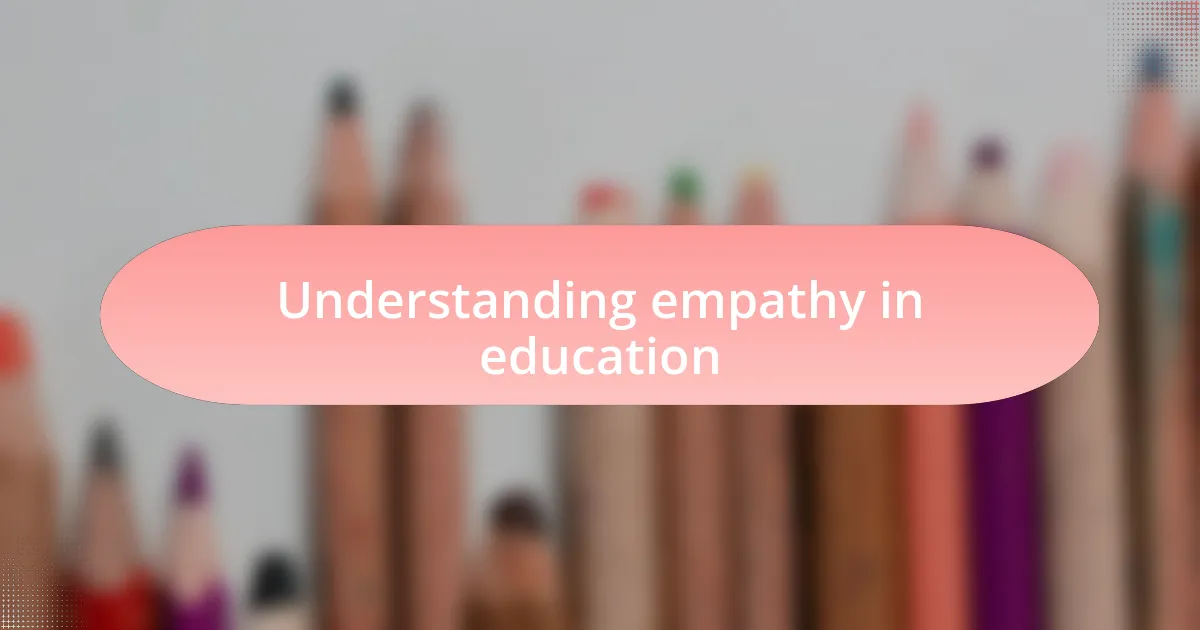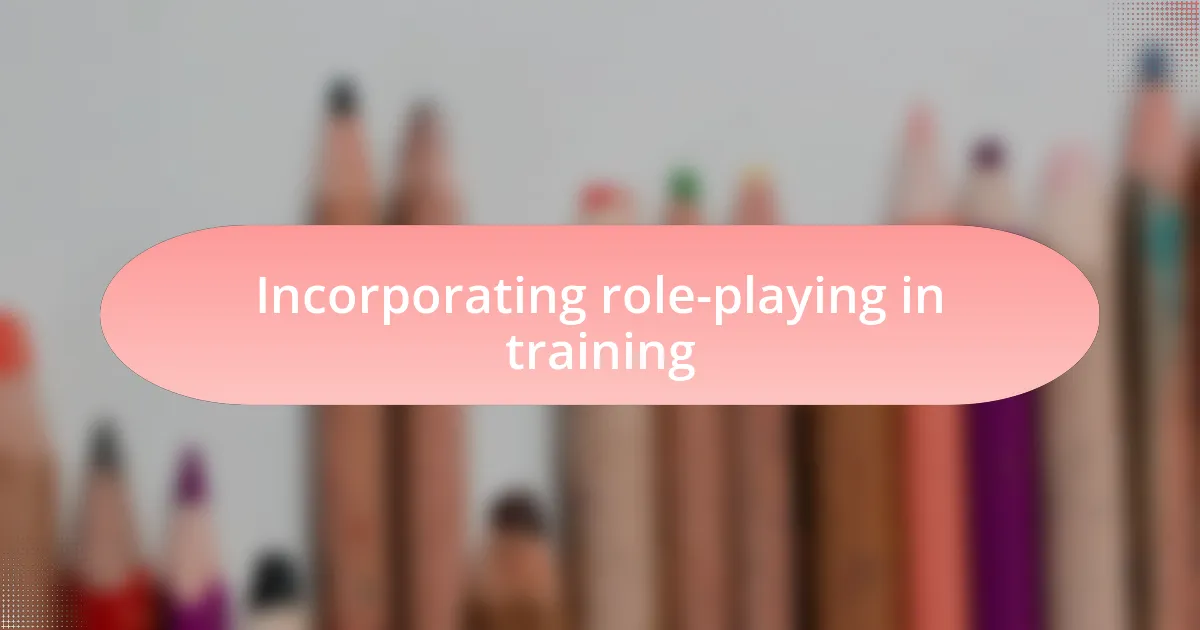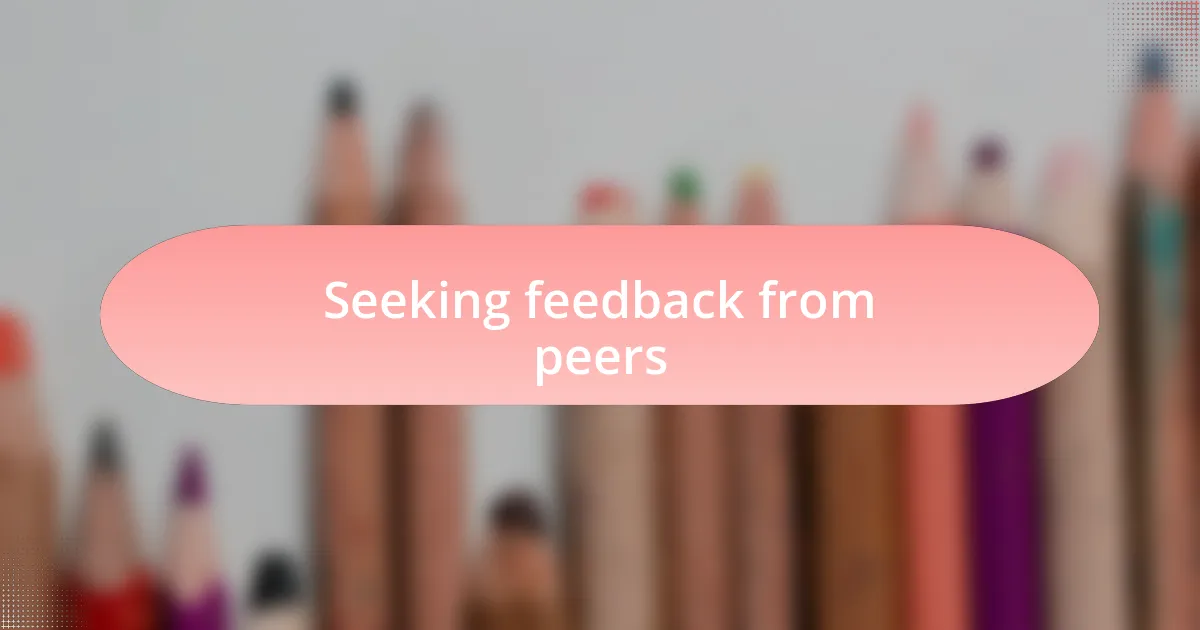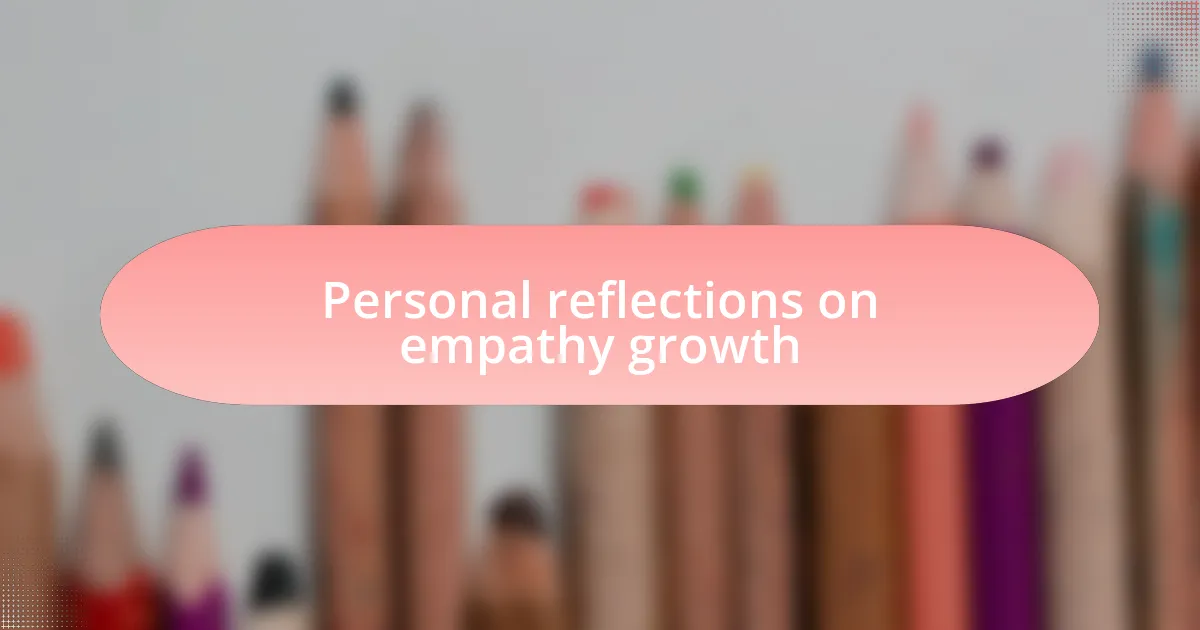Key takeaways:
- Empathy in education creates trust and enhances collaboration, allowing students to feel validated and engaged.
- Role-playing and reflective listening significantly improve empathy skills by enabling individuals to experience others’ perspectives and emotions.
- Seeking feedback from peers fosters self-awareness and strengthens team relationships, highlighting the importance of communication in empathy development.
- Vulnerability and active listening are crucial for forming deeper connections and understanding others’ experiences.

Understanding empathy in education
Empathy in education is about more than just understanding others; it’s about connecting on a deeper level. I recall a moment during a training session when a colleague shared a personal challenge they faced. It reminded me that behind every learner is a unique story, and recognizing this can transform our approach to teaching and supporting them.
When we cultivate empathy, we create an environment that fosters trust and openness. Have you ever noticed how a simple act of understanding can motivate someone? I’ve witnessed students thrive when they felt seen and heard, illustrating how empathy can bridge gaps and enhance collaboration in learning settings.
Moreover, embracing empathy can stretch beyond interactions; it reshapes curricula and teaching methodologies. I’ve often found myself reflecting on how I can design coursework that resonates with my students’ experiences. This realization underscored the importance of incorporating diverse perspectives, allowing learners to feel validated and engaged in their educational journey.

Strategies for enhancing empathy skills
One effective strategy for enhancing empathy skills is actively engaging in role-playing scenarios. Recently, I participated in a workshop where we switched roles to experience the learning challenges faced by others. This experience was eye-opening; by stepping into someone else’s shoes, I could almost feel their frustrations and triumphs. Have you ever tried something similar? It’s incredible how much deeper your understanding can get when you vicariously experience another’s situation.
Another powerful method is to practice reflective listening. I remember a time when a peer shared their feedback on my teaching approach. Instead of just listening to respond, I focused on truly understanding their perspective. By reflecting back what they shared and asking clarifying questions, I could connect more deeply with their insights. This not only enriched my connection with them but also enhanced my ability to draw valuable lessons from conversations.
Finally, embracing mindfulness can substantially boost our empathy levels. I’ve found that taking a few moments to breathe and center myself before interactions allows me to be more present. Have you ever noticed how distractions can lead to misunderstandings? By being fully attentive, I can appreciate the emotions behind someone’s words, fostering a more profound connection that promotes trust and collaboration in our educational environments.

Incorporating role-playing in training
Incorporating role-playing in training can be a transformative experience. I remember one session where we acted out difficult conversations between a manager and an employee. As I stepped into the manager’s role, I felt the weight of responsibility, which helped me grasp the emotional intricacies that come with leadership. Have you ever felt a surge of empathy just by mimicking someone else’s challenges? It’s like seeing through another person’s lens.
Through role-playing, participants can explore sensitive topics in a safe space. During a conflict resolution exercise, I played the role of an upset customer, and my colleague had to respond. It was fascinating to see how my colleague’s body language and tone shifted as he tried to address my concerns. I felt that release of stress when he finally validated my feelings. Isn’t it amazing how a little acting can unveil so much about our communication styles?
Moreover, these role-playing scenarios often spark meaningful discussions afterward. Reflecting on our performances, we shared our feelings and insights, which deepened our understanding of each other’s perspectives. I left that workshop not just with improved empathy skills, but also with a newfound appreciation for my team’s collective experiences. Don’t you think such exercises could build stronger relationships in the workplace?

Seeking feedback from peers
Seeking feedback from peers is an essential step in enhancing empathy during training. I clearly remember a time when I asked a colleague how they perceived my responses during a group exercise. Their honesty was refreshing and, honestly, eye-opening. It made me realize how often I might overlook the emotional cues in my interactions. Have you ever received feedback that changed your entire perspective on how you communicate?
Engaging in open dialogue about our strengths and weaknesses can be quite revealing. One afternoon, during a lunch break, a fellow trainee offered insights about my tendency to interrupt others. I didn’t realize I was doing it, but hearing that truly impacted how I approach conversations now. Isn’t it intriguing how a simple observation from a peer can lead to profound self-awareness?
Additionally, sharing experiences and critiques builds trust within the team. After asking for feedback on a project, I was struck by a teammate’s perspective that brought up points I had completely missed. The process ignited a meaningful discussion about our motivations and concerns. Questioning and listening to each other’s insights not only enhances our empathy but strengthens our collaborative spirit. Doesn’t that just highlight the power of feedback as a tool for growth?

Personal reflections on empathy growth
Recognizing the role of vulnerability in empathy has been a significant part of my growth. I remember a workshop where we were encouraged to share our personal challenges. When I opened up about my struggles, I was surprised by how empathetic my peers were in return. It’s amazing how vulnerability can create a safe space that fosters deeper connections and understanding. Have you ever experienced a moment where sharing your own story encouraged someone else to do the same?
Another reflective moment occurred during a team-building exercise focused on role reversal. Stepping into another person’s shoes, quite literally, forced me to confront my preconceived notions. I recall feeling a wave of empathy for a colleague whose work style differs drastically from mine. This experience taught me that understanding someone’s perspective often lies in how much effort we’re willing to put into seeing the world through their eyes. How often do we challenge ourselves to truly understand others?
Lastly, I learned that practicing active listening is crucial for empathy development. There were times when I would zone out while someone shared their thoughts. But after committing to genuinely listen, I felt a shift not only in my interactions but in how I responded emotionally. I can still recall a conversation where I focused entirely on the speaker, and their relief was palpable. It left an impression on me—how can we enhance our empathy if we don’t first give others the space to be heard?